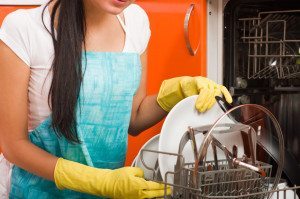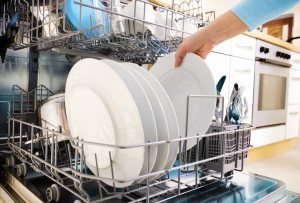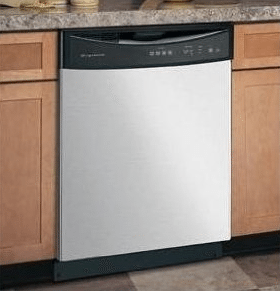The proper way to load a dishwasher is often the subject of spirited spousal debate. If you follow some basic ground rules for loading your dishwasher, your dishes will emerge cleaner; however a few special circumstances warrant further exploration. Read on to learn some tips and tricks for maximizing your dishwasher’s cleaning power.
however a few special circumstances warrant further exploration. Read on to learn some tips and tricks for maximizing your dishwasher’s cleaning power.
Dishwasher Loading Basics
The first rule of dishwasher loading is that soil level correlates directly to space requirements. In other words, the dirtier the dishes, the fewer you can pack in. Place larger and more soiled dishes on the bottom, so they can take full advantage of the proximity of the water’s cleansing action. Whenever possible, tip glasses, cups and bowls at an angle, facing toward the machine’s center, to facilitate water run-off and drying. Most experts advise removing large food particles, but they stress that rinsing is not necessary. Dishwasher detergent is formulated to tackle any food residue and carry it away with the rinse water.
The Finer Points
Take care not to overcrowd the machine, as this will diminish its capacity to clean each individual item. Although your mother may have demanded that all the plates face the same direction, that’s only half true. Face your plates inward, toward the center, alternating large and small sizes. This means that half will face one direction and the rest will face the other way. Cups and glasses should go between the tines on the top rack, rather than over them. Space these items far enough apart that they don’t touch, otherwise they may chip or crack. The unit’s heating coil is located at the bottom, and for this reason, dishwasher-safe plastic items should go on the top so they don’t get melted or warped.
Additional Helpful Hints
Ensure that your flatware is scattered throughout the basket, and not nesting with its friends, to ensure the most effective cleaning. Load large items such as baking sheets and cutting boards around the perimeter of the bottom rack. Some experts suggest running hot water in the sink before starting the dishwasher, to ensure that the cycle starts out with sufficient heat. Finally, run your disposal for a few seconds prior to starting a cycle also, to be sure the sink doesn’t back up while the machine is running. You may have to experiment with different brands and types of detergent to determine which kind works best for your needs.
If your dishwasher just isn’t getting the job done, no matter what you try, this may indicate a bigger problem. In northern Utah, Complete Appliance Repair will inspect the unit and provide a full contingent of maintenance services designed to produce clean dishes as well as ensure efficient operation. With proper maintenance, your dishwasher can make the dishes sparkle every time, no matter how you load it.


 already covered some things you shouldn’t put in your dishwasher, here is a list of surprisingly helpful things that CAN go through a dish cycle successfully, emerging more sparkly clean and fresh that anything washed by hand. One caveat for these: If the item is not related to food or its consumption, it’s probably better not to include any regular dishes in the same wash load!
already covered some things you shouldn’t put in your dishwasher, here is a list of surprisingly helpful things that CAN go through a dish cycle successfully, emerging more sparkly clean and fresh that anything washed by hand. One caveat for these: If the item is not related to food or its consumption, it’s probably better not to include any regular dishes in the same wash load!
